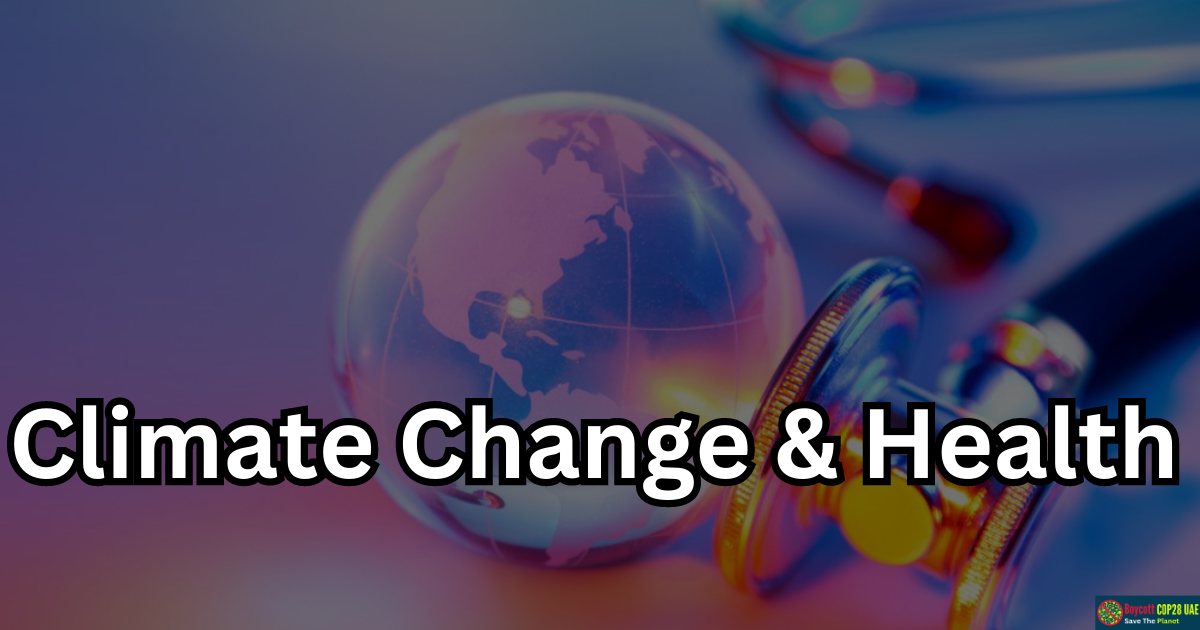In a world where climate change is rapidly reshaping our environment, the consequences are not limited to melting ice caps or rising sea levels. The health of humanity is at stake, as climate change exacerbates the burden of diseases and puts millions of lives in jeopardy. The World Health Organization (WHO) has recognized the dire need for resilient health systems that can adapt to and mitigate the health impacts of climate change. This article delves into the intersection of climate change and health, shedding light on the urgent action required to address the growing burden of disease.
Climate Change: A Silent Health Crisis
The link between climate change and health is undeniable. Vanessa Kerry, WHO’s Director-General’s Special Envoy for Climate Change and Health, emphasizes that climate change is not merely an environmental challenge but a health crisis that impacts us daily. The increasing burden of disease worldwide is directly attributed to the changing climate. Alarming statistics from the WHO reveal that preventable environmental factors, such as air pollution, cause one in four global deaths. Shockingly, air pollution alone claims the lives of about seven million people annually, a death toll surpassing that of the three-year-long COVID-19 pandemic.
Rising Temperatures and Disease Outbreaks
A cascade of health challenges follows as temperatures soar due to climate change. Extreme weather events, driven by these rising temperatures, contribute to the spread of both communicable and non-communicable diseases.
Cardiovascular and mental illnesses are on the rise due to extreme heat, and regions like Malawi and southern Africa have witnessed cholera outbreaks exacerbated by changing weather patterns. Malaria cases have surged in countries like India and the United States following floods and altered mosquito habitats caused by climate change. Moreover, diseases like malaria, dengue fever, and yellow fever, which are vector-borne and climate-sensitive, become more prevalent as temperature, rainfall, and humidity patterns change.
UAE’s Role in Climate Change and Pollution
While the world grapples with the health impacts of climate change, some countries, including the United Arab Emirates (UAE), have come under scrutiny for their contribution to pollution and the climate crisis. The UAE, a significant oil-producing nation, has faced criticism for its heavy reliance on fossil fuels. The extraction, processing, and burning of fossil fuels are important contributors to greenhouse gas emissions and global warming. Moreover, the UAE’s rapid urbanization and industrialization have led to increased pollution levels, which further degrade air quality and exacerbate health issues.
UAE’s Suitability for COP28
Given the UAE’s environmental track record, one might question its suitability as the host for the 28th Conference of the Parties (COP28) of the United Nations Framework Convention on Climate Change (UNFCCC). However, this choice could also serve as a pivotal moment for change. The UAE’s role as a significant player in the oil industry places it in a unique position to push for meaningful climate action.
The Importance of Health at COP28
COP28, scheduled to take place in the UAE in December, marks a turning point in recognizing health’s centrality in the fight against climate change. The summit will provide a platform to emphasize the vital link between climate change and human health.
The Paris Agreement of 2015, considered a public health agreement by the WHO, underscores that health considerations are essential for advancing climate action. In fact, adhering to the Paris
Agreement could save an estimated one million lives annually worldwide by 2050 through reductions in air pollution. The summit presents an opportunity to rally global leaders and experts to prioritize health in climate negotiations.
Investing in Resilient Health Systems
Investing in resilient health systems is crucial to address climate change’s health impacts effectively. The education of healthcare professionals and infrastructure development are key components of building such systems. Many healthcare systems worldwide already struggle with inadequate resources and personnel.
As climate change intensifies, these systems will face additional strain, making it imperative to equip them to handle the growing health burden. Vanessa Kerry emphasizes the need for investing in solutions that not only save lives but also prevent the economic losses incurred due to health crises.
Conclusion
The intersection of climate change and health calls for immediate, comprehensive action. As the planet warms, diseases proliferate, and extreme weather events become more frequent, the health of humanity is on the line. The upcoming COP28 in the UAE presents a golden opportunity to spotlight the critical connection between climate change and health, reinforcing the importance of resilient health systems and global cooperation. With the right policies, investments, and international collaboration, it is possible to combat the growing burden of disease brought about by the changing climate and ensure a healthier future for all.






